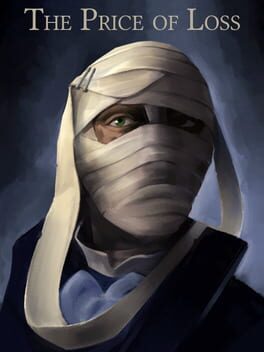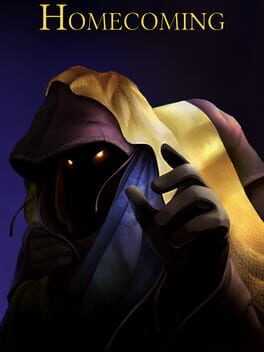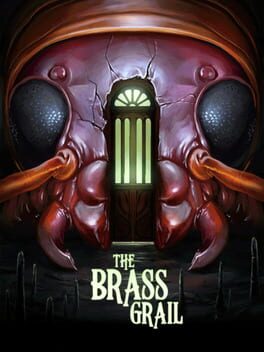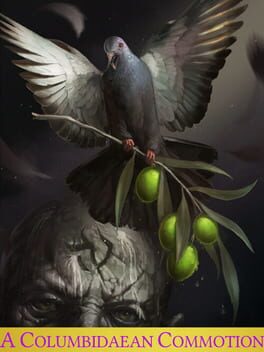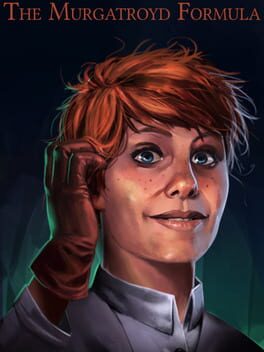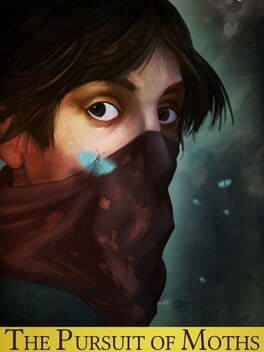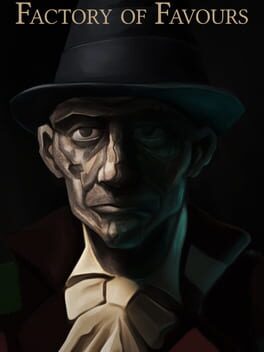rngwrldngnr
Bio
Nothing here!
Badges

On Schedule
Journaled games once a day for a week straight

2 Years of Service
Being part of the Backloggd community for 2 years

Liked
Gained 10+ total review likes

N00b
Played 100+ games
194
Total Games Played
000
Played in 2024
194
Games Backloggd
Recently Played See More
Recently Reviewed See More
The first story in the Season of Adorations is "The Pursuit of Moths". If it's the Gothic Romance of the season, focused on the tragedy of love and a sense of impending doom, then "The Murgatroyd Formula" is the Wry Satire of the bunch. It's basically a workplace sitcom, with the love theme of the season being explored through the somewhat antagonistic relationship between two sisters (and more distantly the father that got them into this situation).
The Murgatroyd Company is one of the big fictional post-fall conglomerates who keep popping up across the Fallen London universe. It's also a front for a major player in the Great Game, something that is sort of an open secret, to the players if not the people of London. Here you get a little bit of a glimpse at the family that created it. Tabitha and Harriet Murgatroyd get handed an Apothecary business from their father, and cannot agree on anything regarding the operations, to the point that they are unprepared for the grand opening. You more or less just get dragged in as a convenient bystander to tie-break their arguments and help with all the last-minute errands.
Harriet is somewhat older, and more business minded. She'd like something boring but profitable. She wants to prover herself to her father, because she want's to get more involved with the family business, both the public and secret aspects of it. Tabitha wants to showcase her chemistry skill, and is constantly looking for new, experimental, and morally dubious angles. She wants to succeed here, but that's more incidental. If it proves anything it's that she could be off on her own. She essentially wants to be a Fallen London player character.
The story is pretty light, there's lots of bickering and possibility for misunderstand. It's also likely to get a happy ending. It's rare for me to try ruining things for supporting characters, but there are often options to do so. This story is set up so that most at least of the outcomes come up positive for the sisters. The one who gets their product launched gets to see their ideas vindicated, but the other learns to respect their sister's ideas more. It is pretty easy to reconcile them to each other even if, for example, you talk Harriet into following her dreams and abandoning the family business.
This story really worked for me, the player and story sometimes disagree on what constitutes a 'good' ending, but Mary Goodden has a talent for having her characters bounce back from most outcomes while still allowing the player a lot of expressive freedom, so that you are unlikely to doom anyone in her stories by sticking to your principles. At the same time, she does great work fleshing out characters, and giving the player a lot of expressiveness in interacting with them. I know her stories don't seem to work for everyone, but you're a Goodden fan, or are looking to learn more about her, then I'd give this one a strong recommendation.
The Murgatroyd Company is one of the big fictional post-fall conglomerates who keep popping up across the Fallen London universe. It's also a front for a major player in the Great Game, something that is sort of an open secret, to the players if not the people of London. Here you get a little bit of a glimpse at the family that created it. Tabitha and Harriet Murgatroyd get handed an Apothecary business from their father, and cannot agree on anything regarding the operations, to the point that they are unprepared for the grand opening. You more or less just get dragged in as a convenient bystander to tie-break their arguments and help with all the last-minute errands.
Harriet is somewhat older, and more business minded. She'd like something boring but profitable. She wants to prover herself to her father, because she want's to get more involved with the family business, both the public and secret aspects of it. Tabitha wants to showcase her chemistry skill, and is constantly looking for new, experimental, and morally dubious angles. She wants to succeed here, but that's more incidental. If it proves anything it's that she could be off on her own. She essentially wants to be a Fallen London player character.
The story is pretty light, there's lots of bickering and possibility for misunderstand. It's also likely to get a happy ending. It's rare for me to try ruining things for supporting characters, but there are often options to do so. This story is set up so that most at least of the outcomes come up positive for the sisters. The one who gets their product launched gets to see their ideas vindicated, but the other learns to respect their sister's ideas more. It is pretty easy to reconcile them to each other even if, for example, you talk Harriet into following her dreams and abandoning the family business.
This story really worked for me, the player and story sometimes disagree on what constitutes a 'good' ending, but Mary Goodden has a talent for having her characters bounce back from most outcomes while still allowing the player a lot of expressive freedom, so that you are unlikely to doom anyone in her stories by sticking to your principles. At the same time, she does great work fleshing out characters, and giving the player a lot of expressiveness in interacting with them. I know her stories don't seem to work for everyone, but you're a Goodden fan, or are looking to learn more about her, then I'd give this one a strong recommendation.
This review contains spoilers
The Pursuit of Moths is our opening to the Season of Adoration. The season is about "love of all kinds from friendship to worship". This serves as a fairly cynical introduction to the theme. All the characters are motivated by some form of love or adoration, and all those relationships are unhealthy and destructive.
You get involved in a club formed entirely around the works of a specific street artist, the Moth-cloaked Vandal. The Vandal is making highly illegal graffiti art of Correspondence sigils around the city, using them to draw in Frost-Moths, one of the many stranger life-forms that only exist in the Neath. The club all claim an interest in the Vandal as an artist, and have analyses of here meaning, but all (or at least most) of these are put-ons.
As you investigate the Vandal together, all the other members find reasons to reveal their secrets to you, with the hope you'll help them achieve their real goals. One is an undercover agent for the Ministry of Public Decency and wants to arrest the Vandal. One is a Revolutionary who wants revenge for the Vandal deserting the cause. The final member is her father, and a Snuffer, who wants to reconcile an extremely troubled family history. The founder of the group is more 'sincere' if that's the word, in admiration for the Vandal's art, but that also get's dark.
The Vandal herself also turns out to be somewhat fanatical. She knows about the existence of the Judgements, and that her own parentage makes her "Shameful", condemned by the Judgements for being outside of their design. The Frostmoths are like this as well, and so she is gathering as many as she can to take to the surface to offer up, along with herself, as a sacrifice, knowing that she won't be given salvation.
The Vandal is interesting because you learn broad swaths about her background, but don't know the details. She must have all this information based on how she's making her decisions, but which parts had she known and been willing to live with, and which was the final straw that made her abandon the revolutionary cause for this self-destructive end is left up in the air.
All the characters have some overriding motivation that drives their actions, love for a cause, for the rule of law, for family, for art, for god. Everyone dearly wants something from the Vandal, and it's never something she wants to give. Including the player, if you want her to live. It's hard to judge, but it's quite possible this story is impossible to end bloodlessly, and likely if you did there would be at least as many unsatisfied people as in one of the many ends where at least one is dead.
At the time of playing this felt like a very strong indictment of "adoration", but considering it in hindsight it maybe feels like it's more that you're arriving too late, that any of the characters might have been reconciled with each other but they have gone past the point of no return. I'm not sure exactly. It definitely came off as rather bleak, but I would still say it was satisfying to play.
You get involved in a club formed entirely around the works of a specific street artist, the Moth-cloaked Vandal. The Vandal is making highly illegal graffiti art of Correspondence sigils around the city, using them to draw in Frost-Moths, one of the many stranger life-forms that only exist in the Neath. The club all claim an interest in the Vandal as an artist, and have analyses of here meaning, but all (or at least most) of these are put-ons.
As you investigate the Vandal together, all the other members find reasons to reveal their secrets to you, with the hope you'll help them achieve their real goals. One is an undercover agent for the Ministry of Public Decency and wants to arrest the Vandal. One is a Revolutionary who wants revenge for the Vandal deserting the cause. The final member is her father, and a Snuffer, who wants to reconcile an extremely troubled family history. The founder of the group is more 'sincere' if that's the word, in admiration for the Vandal's art, but that also get's dark.
The Vandal herself also turns out to be somewhat fanatical. She knows about the existence of the Judgements, and that her own parentage makes her "Shameful", condemned by the Judgements for being outside of their design. The Frostmoths are like this as well, and so she is gathering as many as she can to take to the surface to offer up, along with herself, as a sacrifice, knowing that she won't be given salvation.
The Vandal is interesting because you learn broad swaths about her background, but don't know the details. She must have all this information based on how she's making her decisions, but which parts had she known and been willing to live with, and which was the final straw that made her abandon the revolutionary cause for this self-destructive end is left up in the air.
All the characters have some overriding motivation that drives their actions, love for a cause, for the rule of law, for family, for art, for god. Everyone dearly wants something from the Vandal, and it's never something she wants to give. Including the player, if you want her to live. It's hard to judge, but it's quite possible this story is impossible to end bloodlessly, and likely if you did there would be at least as many unsatisfied people as in one of the many ends where at least one is dead.
At the time of playing this felt like a very strong indictment of "adoration", but considering it in hindsight it maybe feels like it's more that you're arriving too late, that any of the characters might have been reconciled with each other but they have gone past the point of no return. I'm not sure exactly. It definitely came off as rather bleak, but I would still say it was satisfying to play.
Factory of Favours has consistently been the lowest rated Exceptional Story since it's release. The only Fate-locked content rated lower is The Rubbery Murders, a story short enough that you're likely paying about $0.25 per paragraph, and which has probably been purchased more often accidentally by someone looking for Flute Street than by people who actually want to play it. I don't share the same level of vitriol for Factory that I've seen in other players, but I do understand why it's so poorly rated.
Factory of Favours was the closing story of the Season of Silver. The first story in the season was Steeped in Honey, which is generally well liked (and I adored). The second is Lamentation Lock, which is felt to be mediocre, but furthermore is very similar to Factory of Favours in mechanical structure and themes (at least probably, they're both fairly vague feeling to me). So after a great story, you've got 2 much more middling ones, but the third one feels like a rehash of the story immediately before it, but worse.
Lamentation Lock I said had too many characters sharing focus, to let them be developed enough to build on how interesting their concepts were. Factory of Favours has 3 characters. There's the man who hires you for the story. He doesn't care if you actually do the job or not, which might be interesting in another game, but is fairly common for ES quest givers. There's the factory manager, who is distinguished by the fact that she is not a rat or a clay man, and that you interact with her even less than the other characters. And then there's Boris. Put a pin in him for a minute.
Lamentation Lock had the three wards peopled by various "criminals" roughly categorized into Dangerous, Shadowy, and Watchful crimes. But while the ward leaders were the only named characters, other's didn't feel completely samey. When you were doing greased wrestling in the violent wards, it felt like you were talking to distinct groups than when you were comparing knife collections or gossiping about the Recidivist. In comparison in Factory of Favours there are rats and clay men at the factory, but aside from Boris, who we'll get to shortly, there's noting setting any of them apart. They are effectively indistinguishable.
Then there's Boris. The two main strikes against Boris are that we know nothing interesting about him, and he is constantly annoying. He is your antagonist, in that he does not want the factory to resume normal operations, but it's unclear why he doesn't want this. He may or may not be unfinished. I saw people in both camps in terms of guessing which was true, and trying to explain his actions through that, but there just wasn't much to go on. He never explains what he actually wants, or gives any kind of backstory.
In terms of the annoyance, Boris starts of on a bad foot by unexpectedly putting you in debt for asking a question that he insists it will be useful to know the answer to, but which has no mechanical benefit, and little narrative purpose. Through out the story, Boris is watching you, and will Dislike if you do things he does not approve of. While these may be obvious with some thought, they're usually not signposted, and sometimes this happens even on checks that you have succeeded at. This will eventually lock you out of some endings. It wouldn't be deal breakers, except that, again, it's never really clear why any of this is happening.
You're trying to get a factory working again. Why did it stop? it seems like people just took to pointless bartering, and it feels like this is meant to be a metaphor for capitalism or the like, but it just doesn't seem to have teeth. No one can explain the point, just give longer and longer but uninformative explanations of why any given transaction is profitable for them. It doesn't help that the rats and clay men are treated as undifferentiated masses. You try to ask the rats what's going on and it's as much as stated that they have no idea, they just sort of got caught up in things. The clay men just go along with it, in a way that makes it feel, moreso than really any other story, that the idea is that they're essentially factory robots that have gone wrong, following the wrong commands. If this kind of thing were personified in a character, it might help some (Boris doesn't count, not being heavily characterized, and lacking clear motiviations), but as the undifferentiated masses of species, it almost comes off as racist.
So you go to a random factory, play along with the workers for a while, fix a machine with no obvious purpose, and then fix things, save the workers from themselves, and then fix things, or don't.
This wasn't Graham Robertson's only ES, it was his fourth and last. I assume at least some of that was the very negative reception. While I liked some of his other work, his other stories are generally unpopular as well, though not to this extent, and I could see both Failbetter or Robertson lacking the interest in further collaborations after this reception. I do really wish I knew more about Robertson though. His Exceptional Stories are the only works listed on IFDB, but it seems hard to believe he'd be hired for Exceptional Stories without some kind of portfolio. And I'd like to see him playing to his strengths elsewhere, to maybe get a handle on where this one went so wrong.
Factory of Favours was the closing story of the Season of Silver. The first story in the season was Steeped in Honey, which is generally well liked (and I adored). The second is Lamentation Lock, which is felt to be mediocre, but furthermore is very similar to Factory of Favours in mechanical structure and themes (at least probably, they're both fairly vague feeling to me). So after a great story, you've got 2 much more middling ones, but the third one feels like a rehash of the story immediately before it, but worse.
Lamentation Lock I said had too many characters sharing focus, to let them be developed enough to build on how interesting their concepts were. Factory of Favours has 3 characters. There's the man who hires you for the story. He doesn't care if you actually do the job or not, which might be interesting in another game, but is fairly common for ES quest givers. There's the factory manager, who is distinguished by the fact that she is not a rat or a clay man, and that you interact with her even less than the other characters. And then there's Boris. Put a pin in him for a minute.
Lamentation Lock had the three wards peopled by various "criminals" roughly categorized into Dangerous, Shadowy, and Watchful crimes. But while the ward leaders were the only named characters, other's didn't feel completely samey. When you were doing greased wrestling in the violent wards, it felt like you were talking to distinct groups than when you were comparing knife collections or gossiping about the Recidivist. In comparison in Factory of Favours there are rats and clay men at the factory, but aside from Boris, who we'll get to shortly, there's noting setting any of them apart. They are effectively indistinguishable.
Then there's Boris. The two main strikes against Boris are that we know nothing interesting about him, and he is constantly annoying. He is your antagonist, in that he does not want the factory to resume normal operations, but it's unclear why he doesn't want this. He may or may not be unfinished. I saw people in both camps in terms of guessing which was true, and trying to explain his actions through that, but there just wasn't much to go on. He never explains what he actually wants, or gives any kind of backstory.
In terms of the annoyance, Boris starts of on a bad foot by unexpectedly putting you in debt for asking a question that he insists it will be useful to know the answer to, but which has no mechanical benefit, and little narrative purpose. Through out the story, Boris is watching you, and will Dislike if you do things he does not approve of. While these may be obvious with some thought, they're usually not signposted, and sometimes this happens even on checks that you have succeeded at. This will eventually lock you out of some endings. It wouldn't be deal breakers, except that, again, it's never really clear why any of this is happening.
You're trying to get a factory working again. Why did it stop? it seems like people just took to pointless bartering, and it feels like this is meant to be a metaphor for capitalism or the like, but it just doesn't seem to have teeth. No one can explain the point, just give longer and longer but uninformative explanations of why any given transaction is profitable for them. It doesn't help that the rats and clay men are treated as undifferentiated masses. You try to ask the rats what's going on and it's as much as stated that they have no idea, they just sort of got caught up in things. The clay men just go along with it, in a way that makes it feel, moreso than really any other story, that the idea is that they're essentially factory robots that have gone wrong, following the wrong commands. If this kind of thing were personified in a character, it might help some (Boris doesn't count, not being heavily characterized, and lacking clear motiviations), but as the undifferentiated masses of species, it almost comes off as racist.
So you go to a random factory, play along with the workers for a while, fix a machine with no obvious purpose, and then fix things, save the workers from themselves, and then fix things, or don't.
This wasn't Graham Robertson's only ES, it was his fourth and last. I assume at least some of that was the very negative reception. While I liked some of his other work, his other stories are generally unpopular as well, though not to this extent, and I could see both Failbetter or Robertson lacking the interest in further collaborations after this reception. I do really wish I knew more about Robertson though. His Exceptional Stories are the only works listed on IFDB, but it seems hard to believe he'd be hired for Exceptional Stories without some kind of portfolio. And I'd like to see him playing to his strengths elsewhere, to maybe get a handle on where this one went so wrong.
